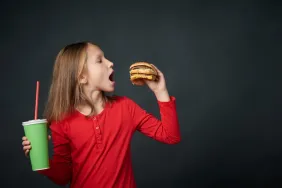The average American eats about 130 pounds of sugar every year. Unfortunately excess sugar intake is associated with diabetes, cancer, heart disease, weight gain, and obesity. Despite what Americans know about the adverse affects of excess sugar, why do we continue to eat and crave these treats?
One reason is that manufacturing companies design these treats to be addictive; by adding addictive and taste-enhancing ingredients like salt, fat, or sugar, then making these foods so easy to consume, we can easily find ourselves eating much more than we planned.
So, do we simply just LOVE sugar, or is it more serious: does addiction lurk behind this significant sugar intake?
Addiction is commonly associated with substances like alcohol, cigarettes, or cocaine. People can also link addictive behavior to gambling, exercise, or reckless behavior. According to American Psychiatric Association, addiction is synonymous to dependency. Some say they are addicted to sugar because they eat a lot of it, can’t seem to control their intake, or resort to it as a comfort food. The reality is that those who are “addicted” to sugar actually have neurological and brain pathways similar to those who are addicted to abusive drugs. So before you question your self-control or willpower, consider that sugar may be as addictive as cocaine.
Refined processed sugars have an addictive potential and has neurological effects that resemble that of a drug addiction. Words like “tolerance” and “withdrawal” are commonly associated with drugs; but several science journals have begun using these terms to describe sugar addictions. For example, when someone eats high-sugar foods repeatedly and at high doses, the body develops a higher “tolerance” for this food. This means that over time with repetitive binging behaviors, more of this sugary food is needed to bring on the same effect. Afterwards, if the sweet is not eaten for a while, “withdrawal” signs can occur. During this withdrawal period, our cravings become even more intensified and our efforts to obtain the craved food increases.
What have you done to score a sweet treat that was on your mind?
Symptoms of a “sugar addiction” are explained by pathways that occur in our brain. There are several neurological pathways that are seen in both drug addictions and sugar addictions.
• Both release dopamine neurons in the nucleus accumben (NAc) of the brain that process behavior reinforcement. So when a drug or high-sugar food is consumed, the NAc stimulates the brain to increase desire for food rewards, appetite for sugar, and cravings. In one study, foods that triggered such an addictive pathway include sugar, saccharin, and corn oil
• Another pathway that proves how sugar cravings are similar to drug addictions is through opioid stimulation. Like dopamine, opioid is related to the “reward, liking, or pleasure” part of the brain. When high amounts of sugary foods are consumed, it increases opioid response. Increased opioid response increases our appetite for high-sugar foods. Not only that but over time, more opioids being stimulated causes the brain to be even more sensitized. What this leads to is that the NAc of the brain responds more to dopamine and opioid even during smaller stimulation time periods. This might be why even a small intake of sugar can cause such a powerful hunger craving and stimulation. A research study injected opioid into subjects and the increased amount of opioid caused an increased intake of foods rich in fat and sugar. Injections that decreased opioid levels caused decreased intake of such foods.
• The last pathway that proves how sugar withdrawal resembles drug withdrawal is through acetylcholine. During morphine, alcohol, or nicotine withdrawal, acetylcholine levels are high and dopamine level is low. Those with sugar cravings show increase in acetylcholine and decrease in dopamine. Those with sugar addiction find that sugar deprivation or withdrawal cause modifications in the brain that manifest a withdrawal symptom similar to that in people addicted to abusive drugs. Additionally, this imbalance (high acetylcholine and low dopamine) does not increase satiety even after sugar consumption, but actually promotes depression. This explains why sugar cravings are never satisfying or long lasting.
We always feel the plummeting effect in our health and esteem after a large sugary binge. No matter how much we want to control the craving, the craving never seems to be satiated and we feel dependent on these high sugar foods, even when it physically harms to our bodies. When we reach for these delicious treats we’re also hoping to feel happier rather than depressed. The way the brain responds to these foods and the sugar addiction that results might explain exactly why they have the grip on us that they do.








